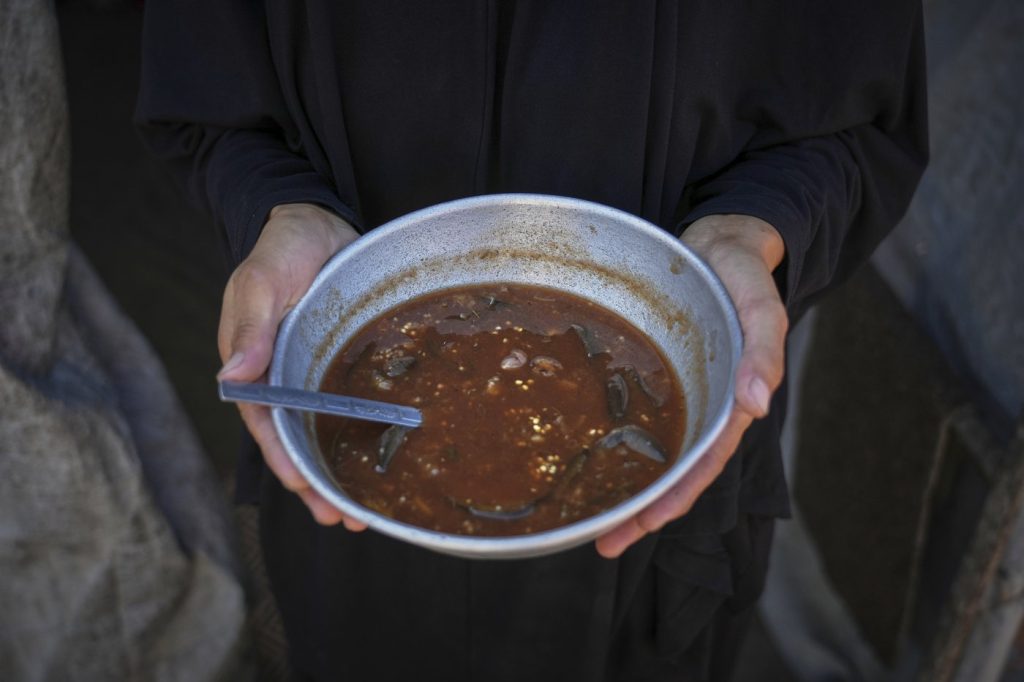DEIR AL-BALAH, Gaza Strip (AP) — A single bowl of eggplant stewed in watery tomato juice now sustains Sally Muzhed's family of six throughout the day. While she refers to it as moussaka, it ultimately bears little resemblance to the fragrant, layered dish that once filled the kitchens of Gaza.
The ongoing conflict has severed families from their means of farming or fishing, drastically limiting food supplies entering the besieged region. Humanitarian organizations report that the food that does arrive is often looted, hoarded, and sold at exorbitant prices. Consequently, mothers like Muzhed have been forced to improvise constantly, reimagining traditional Palestinian staples with the scant ingredients they can procure—whether through aid trucks, airdropped parcels, or modest market purchases.
In early March, Israel instituted a complete blockade on trucks entering the Gaza Strip, allowing aid shipments to resume in May. However, humanitarian experts assert that the quantity of aid remains woefully inadequate. Many cooks are striving to be inventive with their limited resources; still, they admit they are primarily desperate to alleviate the monotony of repetitive meals made from the same few ingredients. Families often find themselves relying on stale, brittle pita, cold cans of beans—due to a shortage of cooking gas— or whatever food remains available at charitable kitchens when they arrive early enough.
Muzhed lamented, “The children remain hungry. Tomorrow we won’t have any food to eat,” while sitting in a tent at a displacement site in central Gaza's Deir al-Balah. Once, her meal would barely satisfy one child; now, she finds herself doling it out in spoonfuls, trying to stretch a meager portion. Her son inquires why he cannot have more.
The struggles faced by the Muzhed family resonate across Gaza as the territory descends into what international experts have characterized as “the worst-case scenario of famine.” On certain days, mothers like Amani al-Nabahin manage to secure mujaddara from charity kitchens; however, stripped of its traditional flavors, the dish is now reduced to its bare essentials: rice and lentils.
According to the Integrated Food Security Phase Classification, nearly nine out of ten households are resorting to extremely severe coping strategies to obtain food, including taking significant risks for their safety and scavenging from garbage. With propane for cooking scarce, and both vegetables and meat increasingly unattainable, the situation remains dire.
Traditionally, families in Gaza would enjoy dipping bread into dukkah, a spiced condiment made of ground wheat. Today, 78-year-old Alia Hanani finds herself rationing bread by the bite, distributing it once a day at noon. Everyone shares a wartime version of dukkah made from flour, lentils, and bulgur. "There’s no dinner or breakfast," she remarked, reflecting the scarcity of food.
For others, circumstances are even grimmer. Rehab al-Kharoubi has managed to procure only a bowl of raw white beans for herself and her seven children, acquired through begging. "I had to beg for it," she confessed. Kifah Qadih, who has been displaced from Khuza'a east of Khan Younis, revealed that she couldn't find any food at all; her bowl remained empty throughout the day as she expressed, “Today there is no food. There is nothing.”
This narrative highlights the increasingly severe food shortages affecting families in Gaza, where traditional dishes are being transformed into mere echoes of their former selves, reflecting a deepening humanitarian crisis amid ongoing conflict.










